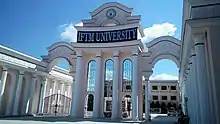IFTM University
IFTM University (Institute of Foreign Trade and Management) is a Private university located in Moradabad, Uttar Pradesh, India.[1] IFTM University was granted university status by UP government vide IFTM University Act No. 24 of 2010. It was established in 1996 and located at a distance of 12 km (7.5 mi) from Moradabad city on Lucknow - Delhi National Highway (NH-24). It has expanded into a 51.74-acre (20.94 ha) campus offering courses in various disciplines and programmes.
 | |
| Established | 2010 |
|---|---|
| Chancellor | Rajiv Kothiwal |
| Vice-Chancellor | M.P. Pandey |
| Location | |
| Website | www |
IFTM University offers more than 70 programs of diploma, undergraduate, postgraduate and doctoral level in engineering, business management, pharmacy, biotechnology, microbiology, arts, sciences, law, education, Journalism and mass communication, social science, computer application, etc. School of Biotechnology (SBT) offers lectures, laboratory-based exercises with linked discussions, Journal Clubs and Experimental Design sessions with the help of highly qualified, experienced and well trained faculty members. The overall goal of the School of Biotechnology is to make basic and translational researches that impact our understanding of the biological sciences and human health and to train the researchers, educators and health care professionals of the future. The previous experience of the SBT states that it provides the students with tremendous opportunity for hands on training in research. The theory and practical exposure to students develops the habit of research including the habit of scientific reading, research methodology, analytical ability, organizational capability, independent thinking and scientific writing. SBT provides a platform for strong learning environment that nurtures and enhances the personality of our students. SBT regularly organizes seminars and guest lectures by experts of National and International repute to a repertoire of scientific areas and scientific methodology. The SBT believes that students are best served when programs focus on the development of durable, translatable skills and fundamental knowledge rather than the rote accumulation of detailed facts. The SBT is currently engaged in innovative themes of work including nonmaterial Synthesis, Advanced functional materials, Structural Biology and Biochemistry.
References
- "Private University Uttar Pradesh". University Grants Commission. Retrieved 17 January 2015.